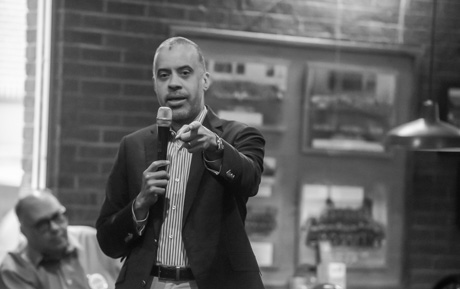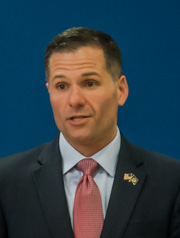Libertarian candidate for governor vows to fight corruption, bring back local control

The Libertarian candidate for governor, Larry Sharpe, stopped at T.F. Brown's in Batavia on Monday and told about two dozen people who attended the breakfast that he has two main issues in his campaign: fighting corruption and returning more control to local governments.
Sharpe's plan for eliminating corruption is to either eliminate or make more accountable the state's various boards and commissions, to change the way infrastructure is funded, and reduce if not eliminate taxpayer funding for economic development.
"Forget the MTA or the Port Authority or Oasis or the Board of Regents or insert name here," Sharpe said. "All they are are boards that now people can be rewarded for being party loyalists. That happens all the time.
"Our current leader, King Andrew, he actually has received over eight hundred thousand dollars from the people he's put on boards for his campaigns."
Sharpe said these boards are unaccountable and impose edicts that people can't fight.
They also give Gov. Andrew Cuomo a layer of insulation. They allow him to say, "it's not me, it's the boards," he said. And he's insulated from any charges of corruption with those authorities.
"That's why everyone around him goes to jail not him," Sharpe said.
Sharpe's plan for infrastructure, he said, will not only help eliminate corruption but it will help get more things funded.
Local businesses should be able to sponsor locks on the Erie Canal to help cover its $100 million annual price tag for upkeep and maintenance. RIT or some other school should release its students on a project to come up with hovercraft to transport people and goods on the canal, which would also help being a student in New York more exciting, to work on those kinds of projects.
"I also want to build whatever is the new Erie Canal," Sharpe said. "I don't know what that is. I want to talk about it. I want to become the marketer-in-chief so I can sell whatever the new Erie Canel is. Is that a new Google road? Is that driverless vehicle road or something like that? I'm OK with that. Let's do it."
Google, or some other company, Sharpe said, would pay for it.
Bridges, he said, should be paid for by private companies. He envisions sponsorships or naming rights, just like, according to him, companies do with sports stadiums now.
"The idea of sponsoring stadiums is working," Sharpe said. "It is successful people keep doing it all over the place. You keep seeing it even locally now, right?"
When somebody in the audience suggested a company could fail, Sharpe said, "yes they could."
But he said, have you ever heard of a stadium named after a company failing or falling prey to corruption?
He said the current system for building and maintaining bridges is rife with corruption and cronyism. Turning the bridges over to companies through naming rights would solve those problems, he said.
"Now while you may not like the idea of some company having the naming rights for a bridge at least the company that has naming rights for the bridge, that company is responsible," Sharpe said. "Someone is actually responsible. Right? Someone is. If they can't do it, you fire them and let another company in there. It's fine. Someone is responsible."
(NOTE: When a company buys naming rights for a stadium, the company is just another advertiser and does not participate in the management of the stadium.)
Just as important to Sharpe as eliminating corruption, the candidate said, is returning control to local governments.
Not only would he end unfunded mandates, he said, he would eliminate all mandates.
Mandates, he said, discourage people from participating in government because they have no control over how their money is spent, so they just give up.
"I get that the reason why so many people don't want to show up for their own government," Sharpe said. "They believe there's no value in doing it. And in many cases they're right. If you have a county or a township or a village where my perception of your budget is mandated why bother showing up?
"Your county your township or village is actually being run by all of you in Albany or Washington, so why show up? It makes no sense. We have a situation where only the four of us show up. So guess what? I guess you're chair, you're vice chair, you're a secretary and you're treasurer. That's it. No one else ever shows up unless they're mad. You've seen that happen. I'm sure you have. People don't show up unless they're mad."
And then when the only people local government officials deal with are people who are mad, Sharpe said, they stop taking them seriously and then make decisions behind closed doors.
Eliminating mandates would re-engage people in their local governments, he said.
He also wants to create a $500 tax credit that people can direct to charities of their choice, with at least half required to stay in the county of the taxpayer's residence.
His other local issue he wants to change is economic development. He believes only private money should support economic development.
"There's a problem that has been popping up in New York State and that is if there's a problem, how can we find a government program to solve it," Sharpe said. "That has been failing again and again and again and again and again. I like when money goes to a small business. I like when money goes into a community. I like when money goes into a town or a city. That's awesome. But how about it not being taxpayer money?"
David Olsen, chairman of the Genesee County Libertarian Party, asked Sharpe to discuss his views on the Second Amendment.
He started by noting that the Second Amendment is about more than a right to own guns.
"It says 'the right to bear arms,' Sharpe said. "What does that mean? It's the right to defend yourself, whether that's a knife, a gun, whatever, it's the right to defend yourself."
He added that the First Amendment and the Second Amendment are interlocked and the Founders intended these two key rights to top the Bill of Rights because of their importance.
"The First Amendment is the most important amendment," Sharpe said. "I don't care who you are. Number one. They're all important freedoms and number one is the most important. If you don't have free association, you don't have a religion, you don't have a press, you don't have freedom of speech. If you don't have those basic freedoms, you don't have freedom. That's the number one overall.
"The rest all matter. That one is number one over all of them. Without that there's nothing. That's critical. What did they put right after that? The one that defends the first. They didn't wait for the right to bear arms to be 10. They made that two."
Sharpe said he thinks the SAFE Act is horrible and though he wouldn't have the power to repeal it, he would pardon the 1,000 or so people who have been convicted of SAFE Act violations so far and encourage law enforcement not to enforce it. He would also block any SAFE Act funding.
As governor, he said, he will be accountable, not appointed boards and commissions.
"What I'm saying is when I'm governor, I'll make sure that every board, every issue, every concern is either under me, chief justice, the Assembly, someone will be responsible for every single thing to get it done," Sharpe said. "I won't be like, our current governor who sits here his last State and laments about how tough things are. Anybody happen to see his state-of-the-state?
"Oh, tough, bad spot, things are so bad -- [interruption] -- he lamented how bad things were. He's the governor for seven years. He's the governor for seven years. What are you lamenting about? It's you. You're the one responsible. It just randomly happened that things got bad in seven years? Come on. It's crazy."

